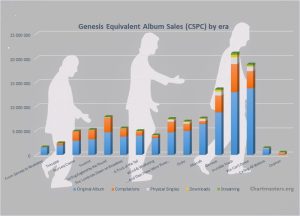Forum
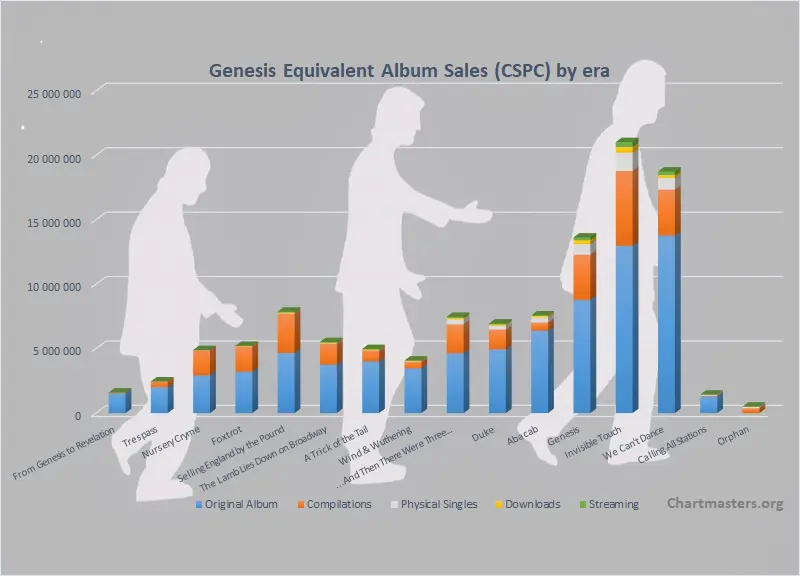
Rare are the bands that have been successful before, during and after the solo success of their members. Genesis are one of them.
Never really hyped, they remained consistently strong from the late 70s to the 90s. We review their discography in numbers.
During the second half of the 60s, most English schools had their own rock bands. Many of them split even before ending their studies, but some kicked an amazing journey, including the iconic Genesis.
Its members were aged from 15 to 17 when they started it in January 1967. Among the founding members, Anthony Philips and Chris Stewart left before their popular years. The remaining three though embarked into incredible careers, they were Peter Gabriel, Tony Banks and Mike Rutherford.
The former led the group during the first half of the 70s. At that time, the band was highly creative, with lyrics featuring fantasy and mythology elements, they were always focused on trying new sounds with an art rock approach. They were one of the first progressive rock bands.
Their career took forever to take off. Even if they have put a lot of work in, they struggled to get a contract. When they did, their early 1968 singles were complete bombs.
So was their debut album from 1969, From Genesis to Revolution. They kept working hard, creating and touring nonstop. Slowly, but surely, they gained a cult following.
Both Trespass (1970) and Nursery Cryme (1971) failed to chart in relevant markets, although they did well kinda randomly in markets like Belgium and Italy.
During these years, the band, which was losing more and more money every year, saw various members come in and out.
Two additions changed their trajectory. In the later Nursery Cryme record, a new drummer got onboard. This was no other than Phil Collins. A year later, a guitarist that was going to become iconic joined them too, Steve Hackett.
With a quintet that we can retrospectively regard as an all-star band, Genesis was still a fairly unsuccessful rock band.
Thanks to both their cult following and a wide critical acclaim, their 4th studio set Foxtrot opened at #12 in the UK in October 1972. After nearly 6 years of activity, at last they were in the news.
After that, their albums started to routinely enter inside the top 10. It still took until 1974 to see them get their first UK Top 40 single, the #21 hit I Know What I Like.
Rather than enjoying their hard-earned popularity, the group was shaken in 1975 when their singer and leader Peter Gabriel left due to growing tensions. He went on to start a very successful career, with the 1986 record So, a multi-platinum album in countries like the US and the UK.
Steve Hackett started to release solo albums as well, sure that the band wouldn't survive to the departure of their singer and main lyricist.
They were all great writers though, and the more down to earth lyrical themes of members like Phil Collins were instead going to increase their fame even more.
Speaking about him, due to their incapacity to hire a new singer, he was a choice by default, as he was the best one among the existing lineup.
The new formation was quickly adopted by the public as well as the first LP with them peaked at 3 in the UK, with a career-record to that point of 6 weeks inside the top 5, while improving their best in the US as well by hitting the top 40 at #31.
Another departure, the one of Steve Hackett in 1977, looked like it would be another huge blow to the group, but incredibly they improved their career bests against with following album And Then There Were Three. The titled was a reference to the remaining lineup made of Phil Collins, Mike Rutherford and Tony Banks.
Their more straightforward sound, with still prog rock elements but without the overly complex parts from the past, made wonders.
The perfect example was the lead single from the album, Follow You, Follow Me. It became their first UK top 10 hit and their first US Hot 100 entry, an entire decade after the band was founded.
This kicked a phenomenal period where both the band and its solo members would get incredible successes.
The 80s was full of multi-platinum albums for the band, kicking in with the UK #1 Duke in 1980. Two months later, Peter Gabriel got his first chart topper too with his 3rd album, itself quickly followed by the first Top 10 LP by Steve Hackett.
A bit earlier, debut albums from both Tony Banks (#21) and Mike Rutherford (#13) performed well too. The later went on to lead Mike + The Mechanics, which got multiple UK and US top 10 albums and/or singles.
And then, of course, in February 1981, Phil Collins issued his solo debut, the super smash Face Value.
While they took forever to get big, after that the band and its members, current and former, seemed everywhere.
The US, at first one of their worst markets, saw Phil Collins get his first Hot 100 #1 smash in 1984, and 3 more in 1985. In 1986, Genesis got its first with Invisible Touch, just to be removed from the top by... Peter Gabriel's Sledgehammer.
In late 1988 and early 1989, within' 5 months, Phil Collins got two more #1s while Mike + The Mechanics made the top as well with The Living Years.
As a symbol, the decade was closed with the former leading the Hot 100 with Another Day In Paradise.
All along the decade, Genesis themselves continued to smash with albums like Abacab, Genesis, and Invisible Touch.
In 1991, they were on top again with the global smash record We Can't Dance. This was the end of a unique trajectory of a band that almost increased in popularity era after era for 25 years.
From the mid-90s, suddenly, the band and all its former members started to flop. The group's final effort Calling All Stations, the first without Phil Collins, was a major bomb.
They took so long to sell well and then stopped doing it so abruptly that we can wonder if they really sold that much all considered.
If as a franchise they may have a shot to be runner ups of the Beatles, today we will determine how many records the band sold by itself.
As usual, I'll be using the Commensurate Sales to Popularity Concept in order to relevantly gauge their results. This concept will not only bring you sales information for all Genesis' albums, physical and download singles, as well as audio and video streaming. In fact, it will also determine their true popularity.
If you are not yet familiar with the CSPC method, below is a nice and short video of explanations. I fully recommend watching it before getting into the sales figures. Of course, if you are a regular visitor feel free to skip the video and get into the numbers directly.
UPDATE DATES:
- Sales (albums, singles): 2022/05/27
- Streaming (audio, video): 2022/05/27
The Commensurate Sales to Popularity Concept (CSPC)
There are two ways to understand this revolutionary concept. In the first place, there is this Scribe video posted below. If you are unaware of the CSPC method, you will get the full idea within just a pair of minutes.
If you are a mathematical person, and want to know the full method as well as formulas, you can read the full introduction article.
Now let's get into the artist's sales figures in detail in order to apply this concept and define the act's true popularity!
Genesis Album Sales

Original Album Sales - Comments
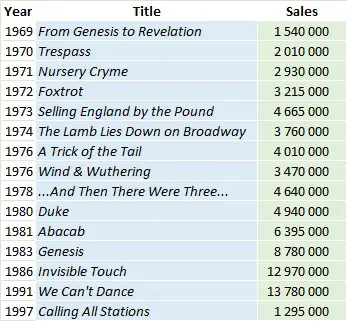
As mentioned in the introduction, the most incredible fact about Genesis' career is how they kept growing during a very long stretch.
Early albums are up to numbers as high as 4.6 million, as it is the case with Selling England by the Pound, despite selling only a fraction of that number when first released.
The explosion of Phil Collins during the 80s impacted the band greatly. Duke sold 5 million, Abacab did 6.4 million, Genesis was even stronger at 8.8 million, and then both Invisible Touch at 13 million and We Can't Dance at 13.8 million were blockbusters.
Invisible Touch was their American peak. Following the unreal success of Collins' No Jacket Required there (12xPlatinum), it moved nearly 7 million units.
We Can't Dance also followed the footsteps of its immediate Collins' predecessor, ...But Seriously. It did so with lower US sales, while breaking records in Europe.
The best showings came in Germany. In the country, by 1995 the highest certified albums of all-time were in fact ...But Seriously at 3 million and We Can't Dance at 2.5 million, the only ones with an award higher than 2 million, thanks to their 42 weeks (17+25) at #1. They remain in the all-time top 5 to this day.
Without their superstar singer, the new trio moved barely 1.3 million copies despite a favorable market background with Calling All Stations.
All told, their discography adds for 78.4 million studio album sales.
Genesis Songs Sales
Below, we list down results from the artist through physical sales, digital sales and streaming.
Please be aware that when the artist is regarded as the lead act, he is rewarded with 100% of these units, while featured acts share among them a 50% piece of the totals.

Physical Singles

As a reminder, the weighting is done with a 10 to 3 ratio between one album and one physical single.
Early singles from Genesis sold next to nothing. Their sales listed here were often achieved thanks to collector items issued decades later.
It's a situation that would be impossible today with a band that still had the support of its label despite dreadful results for many years.
In fact, all physical singles from albums From Genesis to Revelation, Trespass, and Foxtrot flopped badly, while Nursery Cryme didn't even had a single.
UK #21 single I Know What I Like was the first to sell something, although that was still not enough to hit 100,000 copies.
The drought continued with songs from Selling England by the Pound, The Lamb Lies Down On Broadway, A Trick Of The Tail, and Wind & Wuthering struggling.
Of course, it was in part due to the band, as they were regarded and saw themselves as an album band.
Music history tells us that this doesn't mean that much, as every band which sold well did so thanks to popular tracks. In truth, these eras weren't that strong in first place for the band.
Follow You Follow Me changed the course of their career. The song went to the top 10 in the UK, Germany, the Netherlands, and Switzerland, while hitting the top 25 in many places including the US.
This success concluded on over a million sales globally.
From this moment, their singles had a much bigger exposure, with more strong sellers coming out.
From Duke, both Misunderstanding and Turn It On Again topped 400,000 units.
The next era enjoyed the success of its title track, with Abacab shifting 735,000 singles. Man On The Corner and No Reply At All sold in 6 digits too mostly thanks to their US sales, where they made the top 40.
The self-titled album's lead single, Mama, became far and away their strongest success in Europe, with top 10 positions almost everywhere. It was their first top 5 single in the UK, peaking at #4.
In the US, the strong hit from this era was That's All. It reached the #6 spot, outdoing their previous best of #14 from Misunderstanding. Combined, Mama and That's All topped 2 million sales.
Invisible Touch had no less than 5 hits, the title track, Land Of Confusion, Tonight Tonight Tonight, In Too Deep, and Throwing It All Away.
Moderate sellers in Europe, as reflected by their UK peaks (all between #14 and #22), all 5 singles were impressive Top 5 smashes in the US, with Invisible Touch going to #1.
For their last big era, I Can't Dance and No Son Of Mine did very well, registering top 10 spots in countless countries.
Hold On My Heart and Jesus He Knows Me sold less mostly because they came later, when the album had already moved several million units.
Cumulatively, the band shifted a bit less than 14 million physical singles.

Digital songs

As a reminder, the weighting is done with a 10 to 1,5 ratio between one album and one digital single.
For many artists, the top selling physical singles upon release and the most remembered hits since the start of the digital era are very different.
With Genesis, there are no surprise with the same songs being the top performers on both lists.
Among their 70s songs, the top one is once again Follow You Follow Me with 550,000 digital sales.
No other track hits 200,000 sales, with the closest being Carpet Crawlers. These are still low numbers, illustrating a poor lasting appeal for these songs.
Things get better with following albums, although numbers aren't impressive either.
We can point out the example of Turn It On Again, back then seen as their big hit, it registers only 265,000 sales.
The leading hits of their catalog are Land Of Confusion and Invisible Touch, at over 800,000 and 700,000 units, respectively.
If a lack of a big signature song that sold millions is disappointing, various songs are around half a million units.
These are almost all their 80s-90s hits like Mama, That's All, Abacab, Tonight Tonight Tonight, In Too Deep and I Can't Dance.
At just 10 million, their digital sales are still sub-par for a band of this stature.

Streaming
Streaming is made up of audio and video streams. Our CSPC methodology includes both to better reflect the real popularity of each track. The main source of data for each avenue is respectively Spotify and YouTube.
To factor in the growing impact of multiple Asian countries where these platforms aren't always the go-to site for music streaming, more sources have been added.
In order to account for their real popularity in each relevant country, the below sources have been used along with the mentioned ratios that reflect the market share of each area.
Audio Streams
– South Korea: Genie streams * 2.20 (consistent with Gaon streaming numbers)
– Japan: AWA streams * 68 / 4 (AWA has 4% of the Japanese streaming market, and 32% are already considered through Spotify’s extrapolation)
– Arabic world: Anghami streams
– Sub-Saharan Africa: Boomplay + Audiomack streams
– Elsewhere: Spotify streams * 649 / 406 (649 million subscribers of global platforms like Spotify, Apple Music, Amazon Music, YouTube Music, Deezer, etc. against 406 million from Spotify itself) + Genie streams * 2.20 (uses Genie rather than Spotify to extrapolate markets like Taiwan, Thailand and Vietnam)
Video Streams
– China* : QQ video streams * 50 if the song is available for audio stream, QQ video streams * 5 elseway (scale built based on known figures for several major artists)
– Elsewhere : Youtube views increased by 10% to account for various local platforms
*since Chinese streaming platforms are mostly video streaming platforms, their streams are weighted on par with YouTube streams.
Audio Stream value – 1,500 plays equal 1 album unit
Video Stream value – 6,750 views equal 1 album unit
Equivalent Albums Sales (EAS) = ( Spotify * 649/406 + Genie * 2.20 * 2 + AWA * 68 / 4 + Anghami + Boomplay + Audiomack ) / 1500 + ( QQ views* 50(or 5) + YouTube * 1.1 ) / 6750
Top Hits
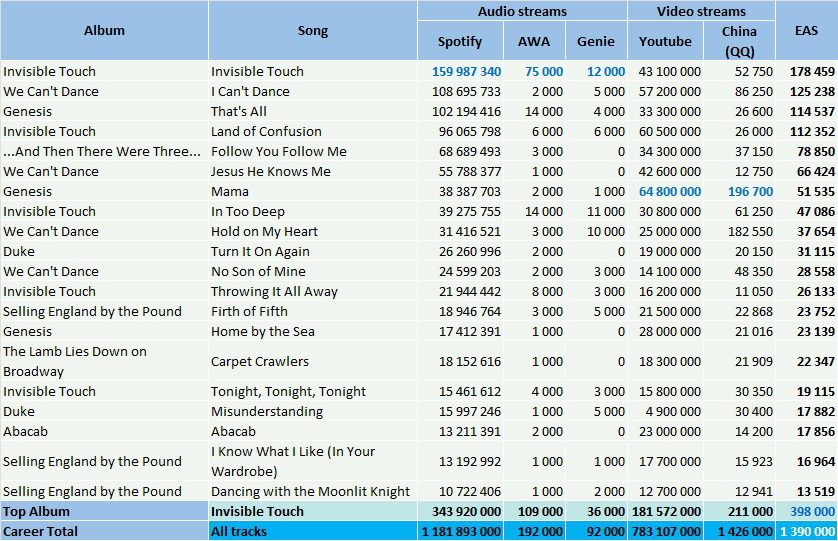
The least we can say is that these numbers are lower than expected. How can we explain that a band which sold nearly 80 million units with studio albums alone, led by one of the most successful solo singers of all-time, can only get 1.39 million EAS from streams?
It's clear that their catalog hasn't aged as well as some other bands. But it's possibly not the biggest reason.
Just like their digital sales aren't too strong because they weren't so big in strong markets for this format like South Korea, their extremely low Latin American success downgrades a lot their impact on streaming.
Countries like Mexico and Argentina, with heavy streamers on both Spotify and YouTube, streamers also used to listen to catalog music, are key for rock bands which are heavily popular there.
Genesis are shockingly weak there though. Their success came mostly from markets like Europe and North America. While these are strong streaming markets, their limited population implies that they aren't as dominant as they were during the physical era.
Having said that, their catalog is led by a quartet of songs from the 1983-1991 period which stand at 100,000+ equivalent album sales.
Invisible Touch is on top with 200 million streams combined on Spotify and YouTube. I Can't Dance, That's All and Land Of Confusion are close to each other at about 120,000 EAS each.
Only two more tracks, Follow You Follow Me and Jesus He Knows Me, are over 50 million streams on Spotify.
The former is actually their only 70s songs that reaches 20 million streams there, which is a terrible fact.
On the other side, their albums have a great consistency. For example, both Selling England By The Pound and A Trick Of The Tail have all their tracks at 2.5 million streams or more.
Speaking about albums, with tracks at 1-4-8-12-16 inside the band's top 20, Invisible Touch is the biggest LP at nearly 400,000 units from streams.
Full catalog breakdown
If you are familiar with the artist's catalog and want to check details of each and every song, you can access to all of them right here.
Keep yourself up to date
Our website provides you a fantastic tool which fetches updated Spotify streams as you request them, use it to watch these results grow day after day!
Genesis compilations sales
It sounds fairly logical to add together weighted sales of one era - studio album, physical singles, downloads, streams - to get the full picture of an album's popularity. For older releases though, they also generate sales of various live, music videos and compilation albums.
All those packaging-only records do not create value, they exploit the value originating from the parent studio album of each of its tracks instead. Inevitably, when such compilations are issued, it downgrades catalog sales of the original LP.
Thus, to perfectly gauge the worth of these releases, we need to re-assign sales proportionally to its contribution of all the compilations which feature its songs. The following table explains this method.
The distribution process

Here is the most underestimated indicator of an album’s success – the amount of compilation sales of all kinds it generated. Due to the dependency of sales of the original studio albums on these releases, they are a key piece of the jigsaw.
How to understand this table? In the example of Live / The Way We Walk (Volume One: The Shorts), these figures mean it sold 4,500,000 units worldwide. The second statistics column means all versions of all the songs included on this package add for 807,092 equivalent album sales from streams of all types.
The second part on the right of the table shows how many equivalent streams are coming from each original album, plus the share it represents on the overall package.
Thus, streaming figures tell us songs from the Invisible Touch album are responsible for 61% of the Live / The Way We Walk (Volume One: The Shorts) track list attractiveness. This means it generated 2,136,000 of its 4,500,000 album sales and so forth for the other records.
Compilations sales figures listing

Full Length related records Sales – Summary
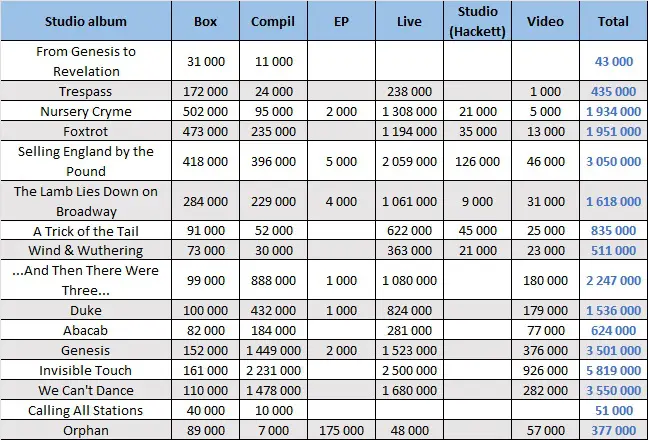
Here is the most underestimated indicator of an album’s success – the amount of compilation sales of all kinds it generated. Due to the dependency of sales of the original studio albums on these releases, they are a key piece of the jigsaw.
These numbers are obtained by applying the method from the section The distribution process to all packages listed under Compilation sales figures listing category.
While no proper compilation of the band came out until 1999, they did issue multiple strong selling live sets.
Various albums fueled more than a million copies of these, with Invisible Touch once again leading the way with 2.5 million sales from live sets, 5.8 million overall.
Selling England By The Pound, Genesis and We Can't Dance are over 3 million each too, while 5 more albums stand at 1.5 million or more.
Bonus: best-selling compilations' breakdowns
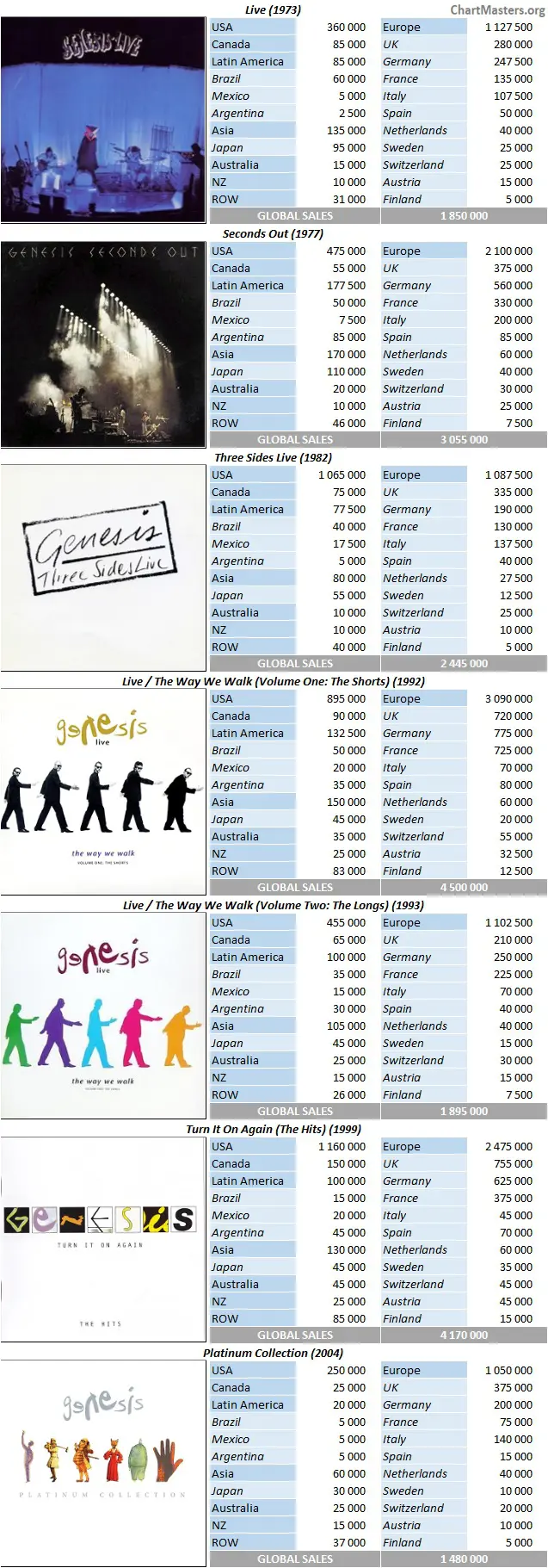
Total Album (all types) Sales per Country
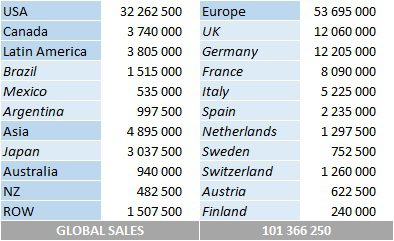
Please note country-specific numbers may miss sales of a few minor releases, although totals are complete.
Genesis Career CSPC Results

So, after checking all the figures, how many overall equivalent album sales has each album by Genesis achieved? Well, at this point we hardly need to add up all of the figures defined in this article!
Albums CSPC results
In the following results table, all categories display figures in equivalent album sales. If different, pure sales are listed between parentheses.
As a reminder:
- Studio Album: sales of the original album
- Other Releases: sales of compilations generated thanks to the album
- Physical Singles: sales of physical singles from the album (ratio 3/10)
- Download Singles: sales of digital singles from the album (ratio 1,5/10)
- Streaming: equivalent album sales of all the album tracks (ratio 1/1500 for Audio stream and 1/6750 for Video stream)
Artist career totals
See where the artist ranks among remaining singers
The top selling pure album from Genesis is We Can't Dance. Invisible Touch gets the last word yet with all-around sales of 21 million units.
The 1986 set enjoyed 5 hit singles and continued to be an important factor on the band's discography when they issued multiple live records and compilations from the 90s.
This number puts it at #3 among our best-selling 1986 albums list behind only Bon Jovi's Slippery When Wet and Madonna's True Blue.
The 1991 smash We Can't Dance is a close second at 18.7 million. That year is so stacked with classics like Nirvana's Nevermind, Metallica's black album, and Michael Jackson's Dangerous that it isn't enough to be part of the top 10.
Genesis completes a strong podium with 13.6 million sales. It was a key album in pushing them further, as the 3 LPs which preceded it did about 7 million apiece.
It's also the case of their Peter Gabriel's era classic Selling England By The Pound which is edging closer to 8 million.
The remaining 71-76 albums Lamb, Foxtrot, Trick and Nursery Cryme average over 5 million sales. The latter, in spite of 4.9 million sales, isn't part of the top 10 albums from the band.
Wind & Wuthering isn't too far away either with 4.1 million. The only albums really lagging behind are Trespass, at 2.5 million still, and their first and last albums, around 1.5 million each.
This outstanding density shots Genesis to 114 million equivalent album sales in their career.
Singles CSPC results
The list is compiled in album equivalent sales generated by each song. Therefore, these figures are not merged units of singles formats.
Instead, it includes weighted sales of the song's physical single, download, ringtone and streaming as well as its share among sales of all albums on which it is featured.
1. 1986 - Genesis - Invisible Touch [Invisible Touch] - 9,260,000
2. 1991 - Genesis - I Can't Dance [We Can't Dance] - 8,490,000
3. 1983 - Genesis - That's All [Genesis] - 6,930,000
4. 1978 - Genesis - Follow You Follow Me [...And Then There Were Three...] - 6,360,000
5. 1986 - Genesis - Land of Confusion [Invisible Touch] - 5,950,000
6. 1991 - Genesis - Jesus He Knows Me [We Can't Dance] - 4,310,000
7. 1981 - Genesis - Abacab [Abacab] - 3,810,000
8. 1983 - Genesis - Mama [Genesis] - 3,550,000
9. 1980 - Genesis - Turn It On Again [Duke] - 3,100,000
10. 1973 - Genesis - Firth of Fifth [Selling England by the Pound] - 2,790,000
11. 1971 - Genesis - The Musical Box [Nursery Cryme] - 2,760,000
12. 1991 - Genesis - Hold on My Heart [We Can't Dance] - 2,560,000
13. 1986 - Genesis - In Too Deep [Invisible Touch] - 2,470,000
14. 1973 - Genesis - I Know What I Like (In Your Wardrobe) [Selling England by the Pound] - 2,380,000
15. 1974 - Genesis - Carpet Crawlers [The Lamb Lies Down on Broadway] - 2,280,000
16. 1991 - Genesis - No Son of Mine [We Can't Dance] - 2,140,000
If you feel inspired by this list, we just created this CSPC Genesis playlist on Spotify!
Discography results
Thanks to our new ASR (Artist Success Rating) concept, we know that their sales represent 19.12 million times the purchase of their entire discography. Coupled with their total sales, it translates into an ASR score of 264.
It is similar to the score of artists like John Lennon, Coldplay, and Van Halen. The ranking of all artists studied so far is available too at this link.
Records & Achievements
- At 21,034,000 equivalent album sales, Invisible Touch is the third most successful album from 1986.
- At 2,500,000 album sales certified, We Can't Dance is officially the best selling album from the 90s in Germany.
- At 5,225,000 album sales, Genesis are one of the best selling foreign bands of all-time in Italy.
- At 14 studio albums, Genesis own one of the longest streaks of consecutive million sellers in Europe.
- Inside the Hot 100 from July 12, 1986, Genesis and its members were responsible for 6 songs on charts, including 4 inside the top 14.
- Cumulatively, Genesis and its members are responsible for more than 150 studio albums.
NB: EAS means Equivalent Album Sales.
Dynamic Spotify Key Performance Indicators
Please note that numbers below are retrieved automatically, so they will evolve day by day unlike previously listed data which is valid as of the publication date of the article.
Current followers count: 0 >> Daily breakdown
Current streams count: 0 >> Daily breakdown
is #0 among the most streamed artists of all-time Popularity Rating: /100 >> Visit our Top 1,000 most streamed artists ranking >> Visit our Top 20 highest rated artists ranking
Current monthly listeners: 0 (Trend: 0) Global chart position: N/A The artist top 50 cities come from 0 distinct countries >> Global impact breakdown
As usual, feel free to comment and / or ask a question!
Sources: IFPI, Spotify, YouTube, Discogs.
You may be interested in...
... Genesis' streaming masters analysis
… best-selling artists, albums, and singles
We have created amazing cross-artists tops. Click to see all CSPC and raw sales results compiled so far!
... similar artists
Fantastic gradual swell of success from the start. Good cumulative numbers!
Does this mean that Phil Collins hits 265 million EAS combining solo and group totals with a 719 ASR score!?!
I wouldn't include the Peter Gabriel-era stuff in his total, so more like 238m, similar to Madonna (245m, but with more video stuff).
Fun fact about Phil Collins/Genesis : he wrote In The Air Tonight for a Genesis album but the other members didn't like it (!) so he figured maybe he should start a solo career 😆
"A Trick of the Tail"'s album sales total says #VALEUR! in the first image.
Genesis has 114 million EAS and they are legends ! Justin Bieber has 92 millions and who he is ?
What is the point of making comments like this? Just to hate on Justin Bieber? The fact is, he will pass Genesis' total in the next 5 years and he will eventually be considered a "legendary" pop artist as more time passes. Each genre has its icons.
Genesis has to have one of the most interesting career trajectories I've seen on this site. Slow gains over two decades, big commercial success, then poof, it's over. Haha. Thanks for the article!
Dear ChartMasters team,
first of all, thank you for your effort in putting information into useful articles. As a music fan, I'm also interested in statistics regarding to chart runs and record sales. I guess I partly understand the way you put together physical, digital and streaming albums, singles, tracks and videos to normalize them into album equivalent sold units. My question is following:
I've read in your Genesis analysis that for example their first album From Genesis To Revelation (1969) has probably been sold/shipped 155,000 units in Germany. I'm just wondering, because that album hasn't been certified there? I know that albums released before 1999 must have been shipped 250,000 to be able to receive a gold certification, so that album is far away from receiving gold. And sometimes record companies miss to certify albums, although they have been shipped beyond the regarded certification. Some years ago I wrote an email to the BVMI (the institute responsible for gold and platinum certifications), but they told me, they didn't give any information for free regarding to sales beside the official certifications. How did you get those information about non-certified (estimated) sold units?
Best greetings.
Landi Schorsch
Actually, he wrote it during the hiatus before Duke in a pile of demos for himself and offered up some of these songs, including Misunderstanding, Please Don't Ask and a version of Behind the Lines, which made it onto Duke. Banks to this day denies having heard In The Air Tonight at the time and insists it was never offered up as a Genesis song, so certainly not true to say they heard it and didn't like it. He admits they'd have probably ruined it by making it too complex.
The world population now is nearly double compared to when Genesis were big, of course he will pass them
Various Genesis members have created tens or even hundreds of millions of EAS values outside of their pure band membership as well, while Justin Bieber would be virtually invisible without the active support of songwriters, programmers, producers and, last but not least, Autotune.
Therefore, the comparison between both artists originally listed in this discussion – as you also continued – is completely absurd.
Of course, I don't mean "as you also continued", but "as we also continued". Translation error, my fault. So, nothing against your contribution, Stefano.
I wasn't trying to offend. I just wanted to discuss whether he should be considered a legend of his time or whether he does not deserve it.
and by the way it used to be "sales" now it is "album equivalent", streaming are converted into sales but in my opinion it makes little sense, it is like comparing two different things
Of course, there are different opinions about whether non-identical formats can be compared. However, since we want to compare artists from different eras in which different music consumption habits are/were common, it therefore makes sense to use a uniform size (EAS) in which each corresponding format (album, single, download, streaming) is broken down by value.
Naturally, each viewer of those data has their own appreciation for certain formats. Ultimately, we'll never find an equation that meets all viewer's expectations.
I'm with Stefano on this, I've always struggled to accept the contrived nature of turning streams into sales, for the sake of continuation and comparison, as they are just so disparate.
What I wrote was more of a general statement on the topic of differences in perception -> assessment of equations.
Of course, I also have some problems accepting that it seems pretty easy for rather streaming-based artists to generate EAS than for artists in the physical era.
What makes me suspicious, for example, is that for example, a casting group like BTS (127 EAS) has already sold more in their relatively short career than a band generally considered legendary Genesis (114 EAS) in their entire time.
I don't want to be understood as someone who intends to cast doubt on the values determined here. Maybe it has to do with that music can be spread more effectively in these days, compared to decades ago. But without being deeply anchored in the matter, it certainly feels at least a little bit peculiar.
